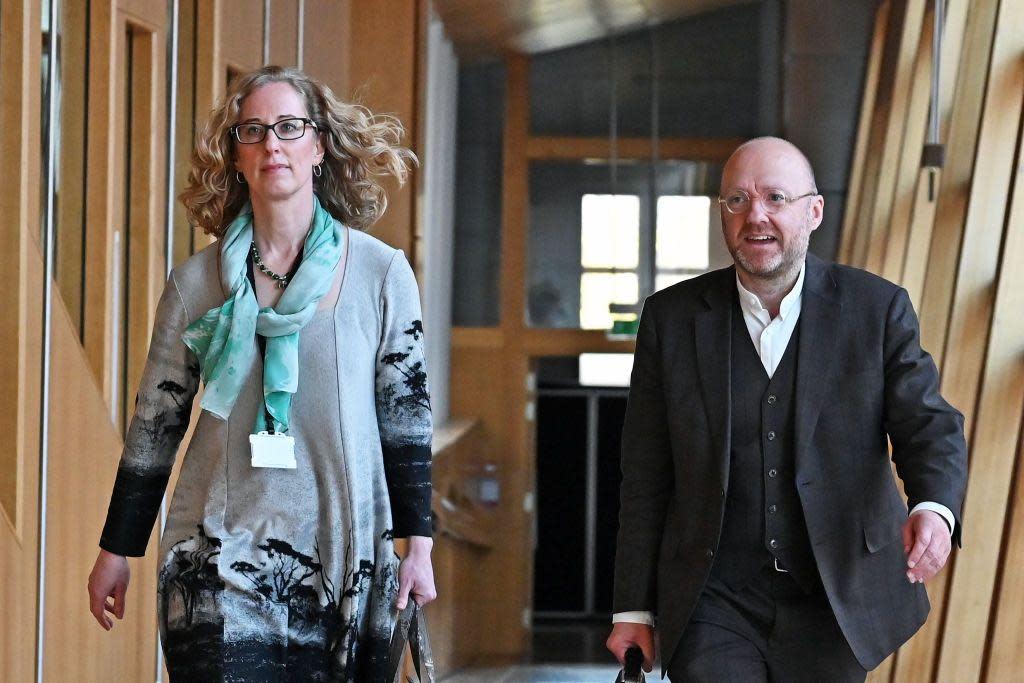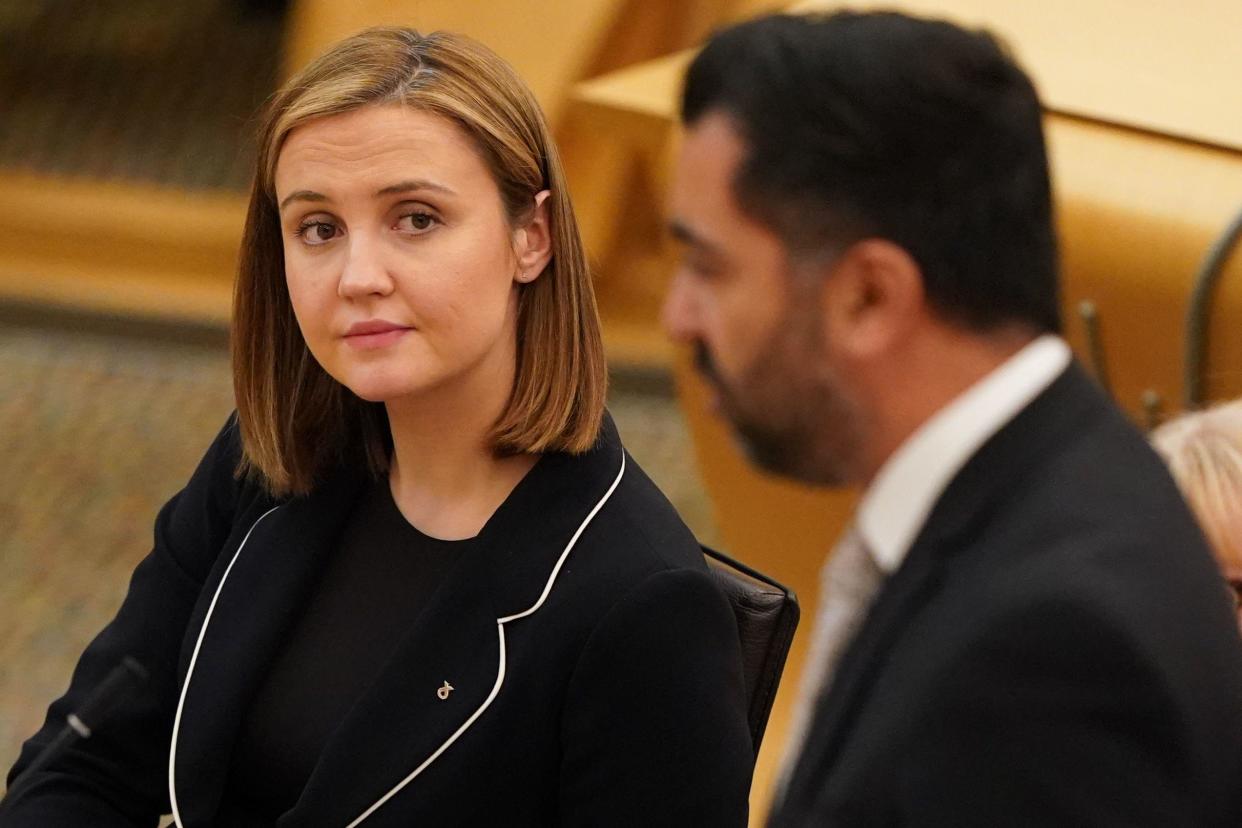Scottish Greens to vote on SNP power-sharing deal

Scottish Green Party members are to vote on whether to remain in power with the SNP after the Scottish government ditched key climate change targets.
Co-leader Patrick Harvie says things have “come to a head” with calls from members for a debate about the way forward.
The Greens are to hold an extraordinary general meeting to decide the issue.
The BBC understands it “is expected to hear a single motion on whether the party continues to co-operate with the Scottish government or not".
Both Mr Harvie and his co-leader Lorna Slater are ministers in the government and will argue that their party should stay there.
First Minister Humza Yousaf said on Friday that whether or not the Greens remained in the power-sharing deal was an internal matter for their members.
BBC Scotland understands the SNP would carry on as a minority government if the Greens were to withdraw support.
Ms Slater said the purpose of the extraordinary general meeting would be to allow members the opportunity to decide how to proceed nearly three years after joining the SNP in government under the Bute House agreement.
She said: “We have achieved more for people and planet in the past 32 months than other parties have in decades. Now we want to hear from our members on how they want us to continue this progress.
“Not everything in politics is easy, as we have seen over recent years, months and days, but our strength as a green movement is in standing up against those destructive forces who would set fire to everything we have achieved if given half the chance."
A binding vote
The party has not announced the date of the meeting but the BBC has been told it will happen some four weeks after members have been emailed to inform them of it.
The announcement of the vote came just a day after the SNP-Green government in Edinburgh confirmed it will scrap its annual and interim targets for cutting greenhouse gas emissions.
In a statement to the Scottish Parliament, Energy Secretary Mairi McAllan of the SNP accepted that the target of a 75% reduction in emissions by 2030 was out of reach.
That accepted the analysis of a critical report from the independent Climate Change Committee.
Ms McAllan said the government must act to chart a course to achieve its target of net zero emissions by 2045 at a pace and scale which was feasible, fair and just.
Mr Harvie said he was "angry and disappointed" following the announcement.
But he has defended the Greens remaining in government, saying their participation has led to “record investment in climate and nature, free bus travel for more young people, rent protection, and much more.”

Scottish Greens councillor Chas Booth, who represents Leith on City of Edinburgh Council, told BBC Radio's Good Morning Scotland programme that as things stood he would vote to withdraw from government.
He said: "Dropping the 2030 target altogether without replacing it with anything that is more achievable looks to me like we’ve, in a sense, given up and walked away on climate. That is unacceptable from my perspective.
Some Greens are also unhappy about NHS Scotland’s decision to pause the prescription of puberty blockers following a landmark review of gender services in England by paediatrician Dr Hilary Cass.
After the NHS Scotland announcement the party’s LGBT wing, the Rainbow Greens, started a petition questioning the future of the deal with the SNP.
The group’s co-convener, Jen Bell, said the move had broken a promise in the Bute House agreement to “put trans patients at the heart of decisions on their own healthcare.”
Dr Cass said “we don’t have good evidence” that puberty blockers — which she defines as hormone treatment that stops the progress of puberty — are safe.
The vote of Scottish Green members will be binding, according to a party source.
The Bute House agreement is described as a “shared draft policy programme” in areas of mutual interest such as climate change, economic recovery from the pandemic and child poverty.
It also takes in the natural environment, energy and the constitution.
Both the Scottish Greens and the SNP advocate for an independent Scotland.
Party criticism
The Scottish government’s decision to abandon its 2030 emissions target put the Greens in the firing line for criticism more often aimed at the senior partners in the deal.
Scottish Conservatives chairman Craig Hoy said the Greens should be "nowhere near the levers of power within government".
He added: "The SNP's independence-obsessed coalition with their anti-growth Green counterparts has been a farcical disaster for Scotland.
“The overwhelming failure of this deeply damaging nationalist coalition is having a devastating impact on communities and businesses which is why the Bute House Agreement needs to be scrapped."
Scottish Labour's deputy leader Jackie Baillie said said it was no surprise that Green party members had "lost faith" in an SNP-Green government which had "failed to deliver at every turn".
She added: "While Green MSPs cheer on Humza Yousaf in Holyrood, he is slashing climate targets and siding with oil and gas giants who are raking in billions in profit.
“This SNP-Green government’s failures mean higher bills, fewer green jobs and other countries winning the global race for clean energy."
First Minister and SNP leader Humza Yousaf has also come under pressure from within his own party to end the power-sharing deal.
Kate Forbes, whom Mr Yousaf only narrowly defeated in the party leadership contest just over a year ago, is among those who have called for the Bute House agreement to go.
In December she said “nearly all the issues that have lost us support in the last year are found in the Bute House agreement and not in the SNP manifesto.”
The Greens, said Ms Forbes, had a progressive, ideological agenda which was unpopular in the country at large and were also hitting rural communities with over-regulation and tax hikes.
The party has been involved in several difficult policy issues, with legislation stalling on issues as varied as protecting the oceans, recycling bottles and making it easier to change gender.
First Minister Humza Yousaf has said he remains committed to the Bute House agreement.
The SNP leader said on Friday that he accepted there would be “bumps on the road” to net zero.
But he insisted his government had “brought forward an accelerated policy package” of measures to tackle the climate crisis which “reinstate our commitment” to achieving net zero by 2045.
